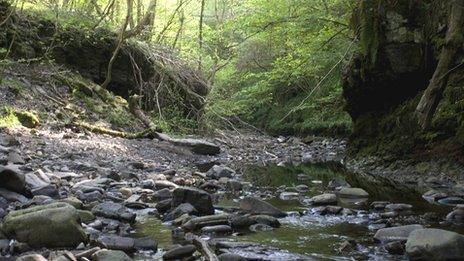Wales water warning by Environment Agency with low river levels after little rain
- Published

The Environment Agency says it is particularly concerned about river levels in east Wales
There are concerns over river levels in parts of Wales after spells of unusually low rainfall in recent months.
Environment Agency Wales says there is no current risk to the public water supply, unlike some areas of England.
But in south east Wales, the Wye, Usk and Ebbw are at or near record low levels.
People are being urged to be careful how they use water to help protect wildlife and the wider environment.
Other rivers affected across south west, mid and north east Wales include the Neath, Ystwyth, Dee and Ceiriog.
The warning comes as the agency extends the areas of England officially in drought to the rest of the Midlands and the south west, including Herefordshire, Bristol and Somerset.
Among the species that could face problems in Wales are migratory fish such as salmon and sewin.
Although rain has fallen this month, both February and March were described as exceptionally dry.
The agency says rainfall in Wales during March was the fifth lowest in 100 years and 70% less than average.
'Conserve supplies'
Last month, the EAW warned about complacency over the water situation in Wales.
Officials are urging people to conserve water and use it "as sparingly as possible".
Chris Mills, the director of the EAW, said there was no problem with the public water supply.
"Most reservoirs in Wales are more than 90% full at the moment," he said.
"However, this is only half the story. Rivers in Wales are affected quickly by a lack of rain, and some rivers are now very low despite the recent wet weather," said Mr Mills.
"Any further dry period could begin to affect wildlife and the wider environment so we are asking people to use water wisely and to help ensure our wildlife is protected," he added.
Roger Falconer, professor of water management at Cardiff University, said that although it appeared there had been a lot of rain recently, the amount was actually "negligible".
Short catchments
"The Taff rose rapidly last week with the rain but it's now fallen back again. I know from some of the work my students are doing that some of the rivers in Wales are particularly low at the moment".
"In Wales, we have short, steep catchments. They rise rapidly and also fall rapidly," said Prof Falconer.
"I don't anticipate for one minute that we are going to have the problems they have in the south and east of England but it does highlight climate change and population growth."
"The current droughts have been a wake-up call for England in particular and they also help to focus attention here in Wales," continued the professor.
"We could live without oil but not without water." he added.
The new drought areas in England declared today apply to the River Severn, Trent and Wye catchments in the Midlands as well as Cornwall, Devon, Somerset, parts of Hampshire and Wiltshire.
Earlier this month, the former chairman and chief executive of Dwr Cymru Welsh Water suggested that Wales could sell water to parts of England affected by drought.
John Elfed Jones said a parallel could be made with the oil industry and he believed that water could be sold for profit.
Welsh Water later said a water transfer proposal was impractical and "too costly".
Transporting water
Prof Falconer said it would be far too expensive to pump water around the UK in what some politicians have called a water "grid".
However he said there were options for transporting water across river basins using canals and gravity with minimal pumping.
The proposals include extracting water from the Severn in Gloucestershire and moving it through canals to the river Thames.
Another idea, which dates back decades, is raising the existing Craig Goch dam in the Elan Valley near Rhayader.
- Published16 April 2012
- Published10 April 2012
- Published13 March 2012
- Published12 March 2012